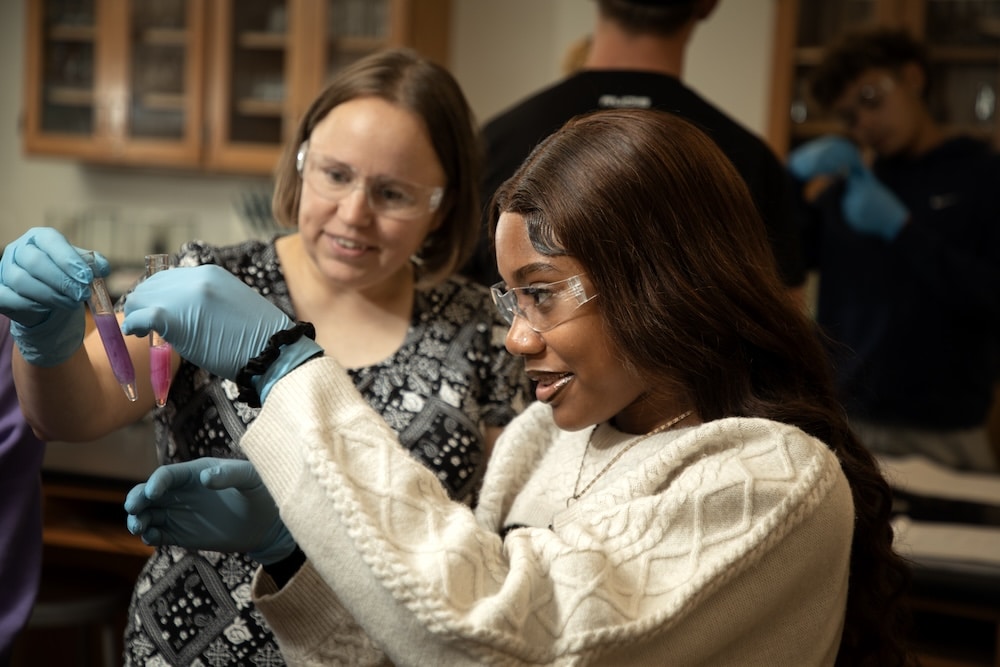Biology is one of the most versatile and impactful fields of study, offering students the chance to explore the science of life at every level – from molecules and cells to ecosystems and the environment. If you’re curious about how living things work, fascinated by health and medicine or passionate about the natural world, a biology degree could be the perfect fit for you.
Biology is the foundation for exciting careers in healthcare, research, environmental science and beyond. Whether you’re interested in pursuing medical school, working in wildlife conservation or conducting cutting-edge research, biology provides the scientific background and critical thinking skills you’ll need to succeed.
In this article, we’ll take a closer look at what a biology degree entails, what you can do with a biology degree and how Tiffin University can help you take your first step into this field.
Biology Degree Overview
A biology degree opens doors to a wide range of academic and career opportunities by providing a deep understanding of the structure, function and development of living organisms. At Tiffin University, students in the biology program are equipped to explore, experiment and grow into the scientists and professionals of tomorrow.
TU’s biology curriculum prepares students to be on the leading edge of biological research and innovation. The program is especially well-suited for those planning to attend medical, dental or veterinary school, offering the rigorous coursework and scientific training needed for advanced study.
As a biology major at TU, you’ll learn how to:
- Read and interpret current scientific research
- Design and carry out original experiments
- Communicate findings clearly and effectively
- Prepare for professional or graduate-level entrance exams
Sample Biology Courses
Tiffin University’s biology program offers a wide range of courses designed to build a strong scientific foundation while allowing students to explore their specific interests. Here are just a few examples of the engaging and rigorous classes you can expect as a biology major:
- BIO250 – Ecology and Evolution: This course explores the role of evolution in shaping today’s organisms, examining how evolutionary processes operate on various levels. Topics include genetic and phenotypic variation, natural selection, population genetics, speciation and macroevolution.
- BIO325 – Botany: This course is a general survey of the plant kingdom, covering plant morphology, physiology, genetics, reproduction, classification, evolution and ecology.
- BIO350 – Animal Behavior: This course offers a comparative study of animal behaviors, analyzing their adaptive value, physiological mechanisms, development and evolution. Students learn to apply scientific reasoning to understand the evolution and function of behavior, with an emphasis on how evolutionary principles connect various subfields in biology.
Biology Degree Jobs
One of the most exciting parts of earning a biology degree is the number of job options available after graduation. Biology majors work in healthcare, research, government, environmental science, agriculture, pharmaceuticals and more.
Here are just some of the careers biology degree holders may pursue. While some roles require an advanced degree, many begin with a solid undergraduate foundation.
- Animal Scientists: Study the genetics, nutrition and reproduction of animals to improve breeding, care and agricultural practices.
- Biochemists and Biophysicists: Investigate the chemical processes behind biological systems to understand everything from diseases to DNA.
- Clinical Laboratory Technicians: Analyze samples such as blood, urine and tissue to assist in the diagnosis and treatment of diseases.
- Conservation Scientists: Manage natural resources, protect ecosystems and promote sustainable land use practices.
- Diagnostic Related Technicians: Operate sophisticated medical equipment to help detect and monitor patient conditions.
- Epidemiologists: Study the patterns and causes of disease in populations to improve public health outcomes.
- Food Scientists and Technologists: Ensure the safety, quality and nutritional value of food by applying biological principles.
- Foresters: Manage forested lands for conservation, recreation and economic purposes using ecological knowledge.
- Life Scientists: Engage in research roles that focus on living organisms and life processes.
- Microbiologists: Examine microorganisms like bacteria, viruses and fungi to understand their roles in health, industry and the environment.
- Optometrists: Specialize in eye care and vision health, with a strong foundation in anatomy and physiology.
- Pharmacists: Prepare and dispense medications, offering expertise on drug interactions and patient care.
- Physician Assistants: Diagnose and treat illness under physician supervision, working in diverse healthcare settings.
- Soil and Plant Scientists: Study how soil, plants and the environment interact to improve agriculture and food production.
- Zoologists and Wildlife Biologists: Study animals in their natural habitats to learn about behavior, ecosystems and conservation efforts.
Pre-Med, Pre-Vet and Pre-Dental Pathways
If your goal is to become a doctor, veterinarian or dentist, a biology degree can provide the academic foundation and support you’ll need to reach your goals. TU’s biology program is carefully designed to meet the rigorous demands of pre-med, pre-vet and pre-dental tracks, giving you the knowledge and preparation you’ll need for graduate school and beyond.
Students pursuing one of these paths will take key science courses in anatomy, physiology, cellular and molecular biology, organic chemistry and biochemistry. These are core subjects required for entrance exams such as the Medical College Admission Test (MCAT), Dental Admission Test (DAT) and Graduate Record Examination (GRE).
Pursue Your Biology Degree at TU
If you’re passionate about science and ready to make a difference, Tiffin University’s biology program can help you take the first step toward a fulfilling career. With small class sizes, supportive faculty and hands-on research opportunities, TU gives you the tools to explore your interests and turn them into real-world success.
Whether your goal is to attend medical school, work in a lab or protect the environment, a biology degree from TU can get you there. Our program is designed to equip you with the knowledge and confidence you need to pursue your academic and professional goals.
